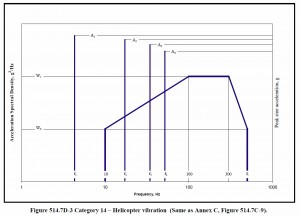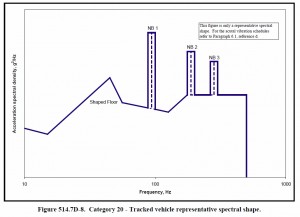Mixed Mode Vibration Testing is less common than Sinusoidal and Random Vibration Testing. However, it does have a special purpose for simulating specialized helicopter vibration or vibration from tracked vehicles such as tanks.
The three mixed modes of vibration testing are:
- Sine-on-Random (SoR)
- Random-on-Random (RoR)
- Sine-on-Random-on-Random (SoRoR)
Some common test standards that have specifications for Mixed Mode Vibration Testing are:
- MIL-STD-810 Department of Defense Test Method Standard for Environmental Engineering Considerations and Laboratory Tests
- RTCA DO-160 Environmental Conditions and Test Procedures for Airborne Equipment
Sine-on-Random (SoR) Vibration Testing
Sine-on-Random (SoR) vibration testing contains sine tones that are superimposed on a low level of broadband random vibration. The sine tones can be fixed frequency or sweeping. If they are sweeping, they are normally very narrow frequency bands. Some examples of SoR vibration are from helicopters, propeller driven airplanes and aircraft rapid gun-fire events.
All aircraft have some levels of random vibration. In helicopters and propeller driven airplanes, the sine tones are produced by the main rotary components. In addition, sine tones can come from rapid gun fire events. Figure 1 shows a typical SoR helicopter vibration test profile from MIL-STD-810G.

Random-on-Random (RoR) Vibration Testing
Random-on-Random (RoR) vibration testing has narrow band random peaks that are superimposed on a low level of broadband random vibration. Typical applications that contain RoR vibration are tracked vehicles such as tanks or a truck changing speed while driving over a rough road. For example, the pitch of the tracks produces rhythmic random vibration peaks at specific frequencies versus speed of the vehicle. Figure 2 shows a typical tracked vehicle vibration test profile from MIL-STD-810G.

Sine-on-Random-on-Random (SoRoR) Vibration Testing
Sine-on-Random-on-Random (SoRoR) vibration testing contains both sine tones and narrow band random peaks superimposed on broadband random vibration. Applications that contain SoRoR vibration could be a rapid gun-fire event on a tracked vehicle or components mounted near a turbine engine with various rotating machinery elements and background random vibration produced by air turbulence.
Whether your vibration testing needs are complex or simple, DES has the experience and knowledge to perform your test. For more information on Vibration Testing or other testing services contact DES or call 610.253.6637.
